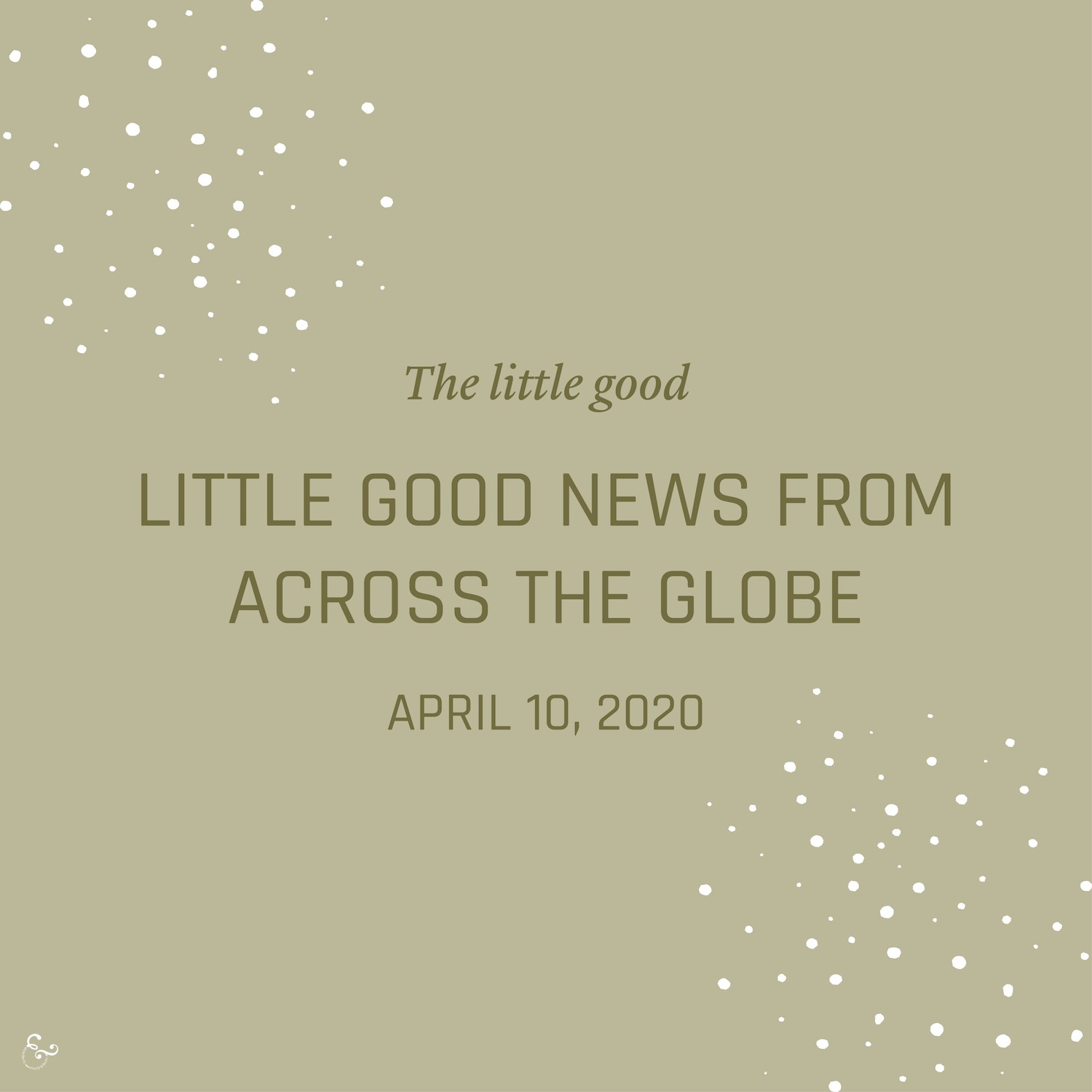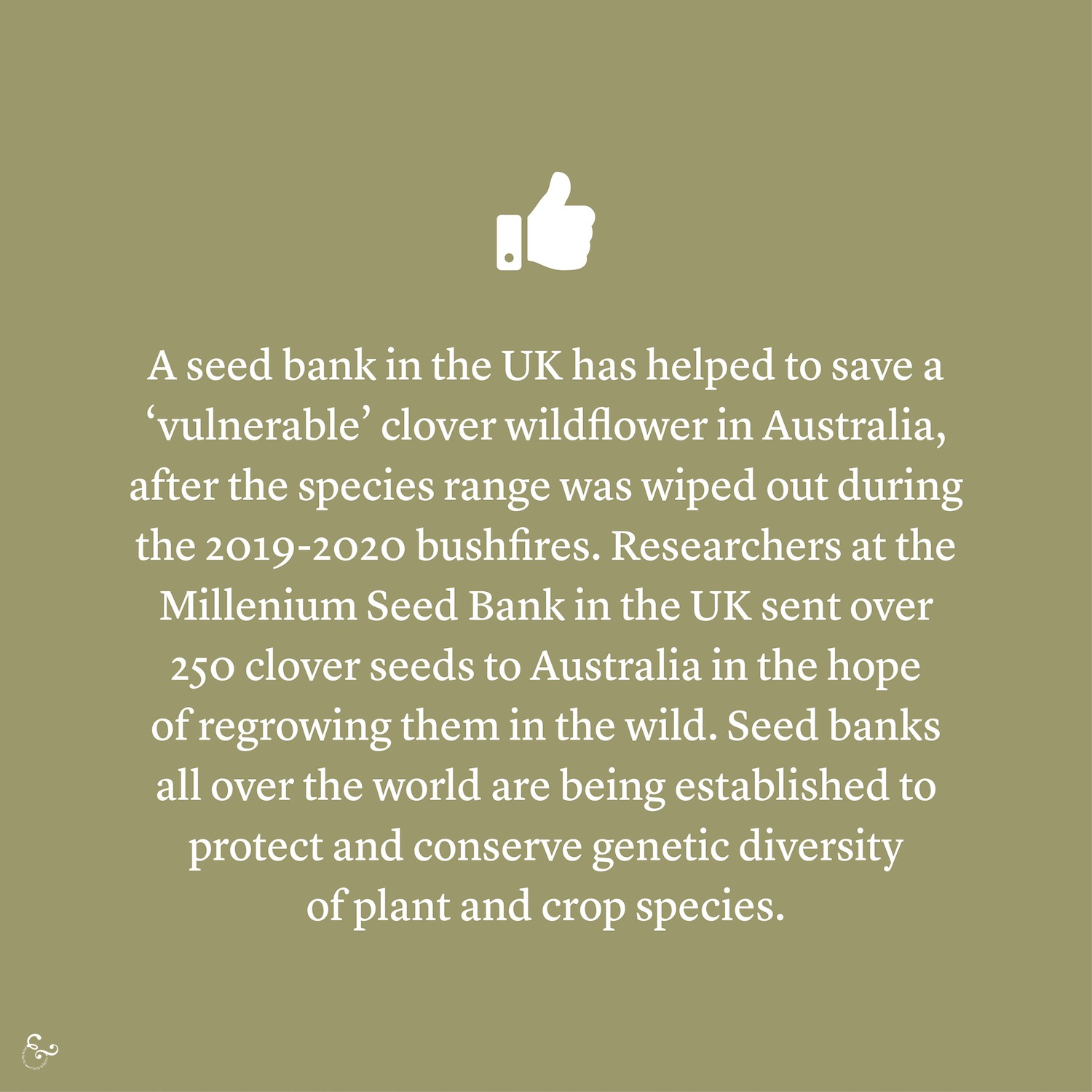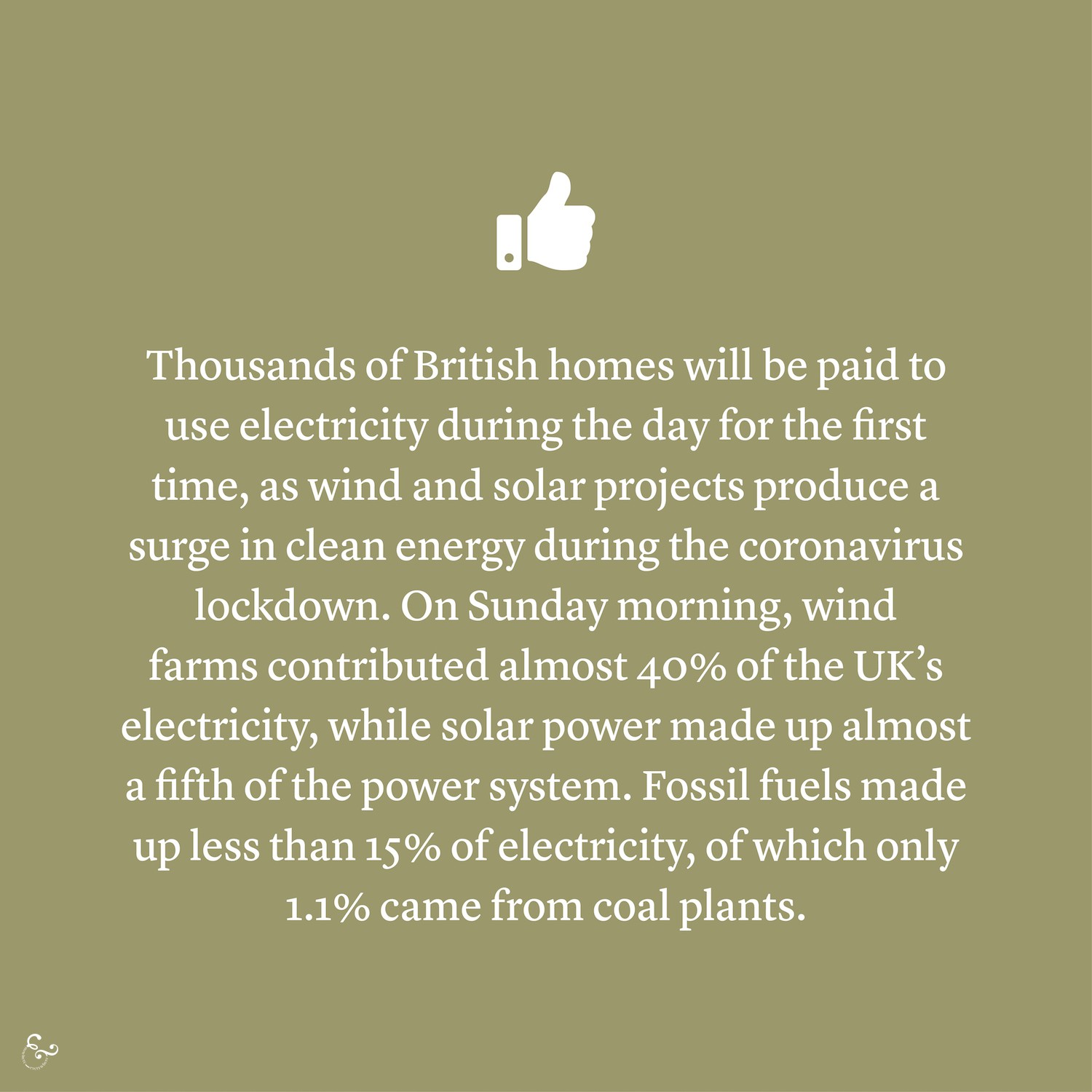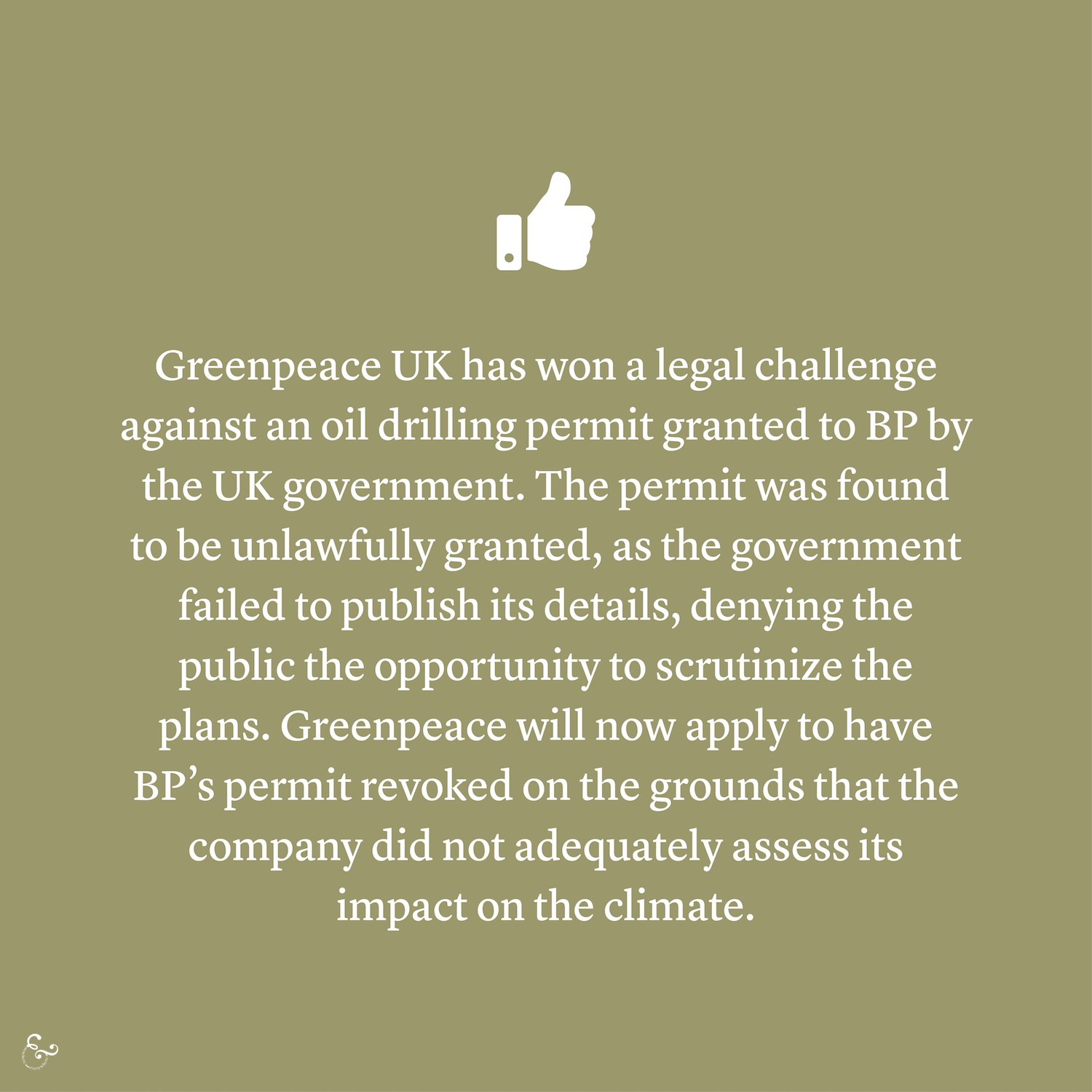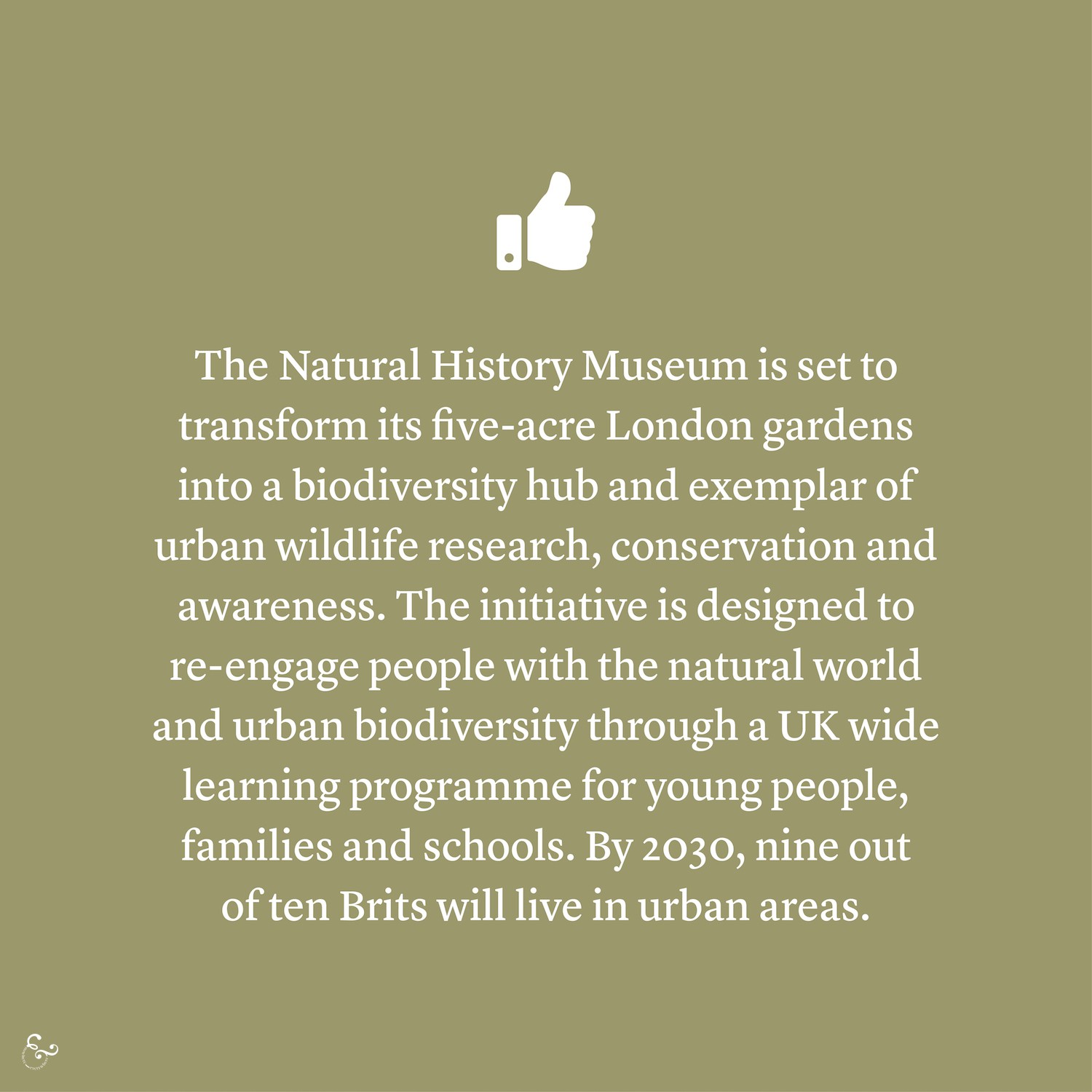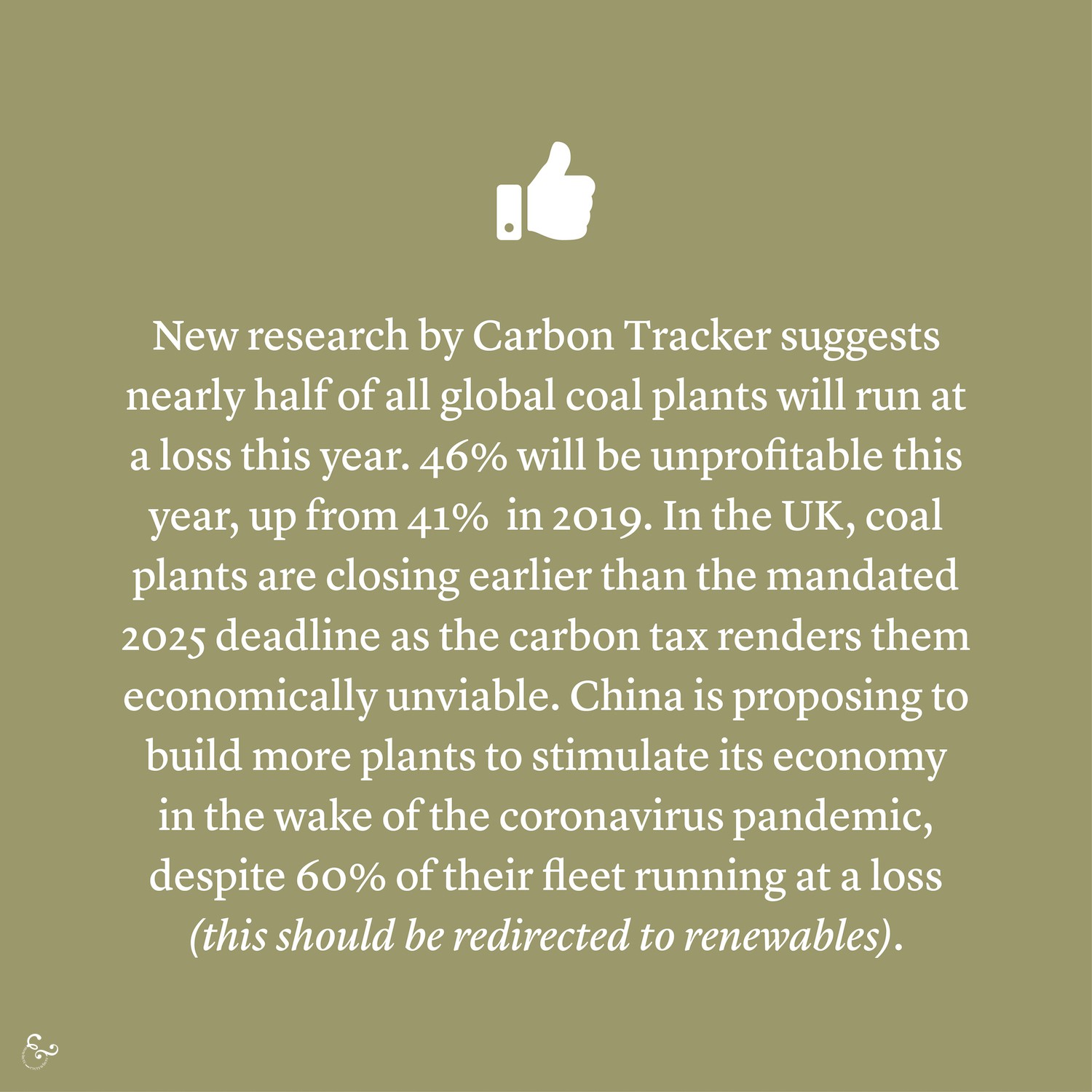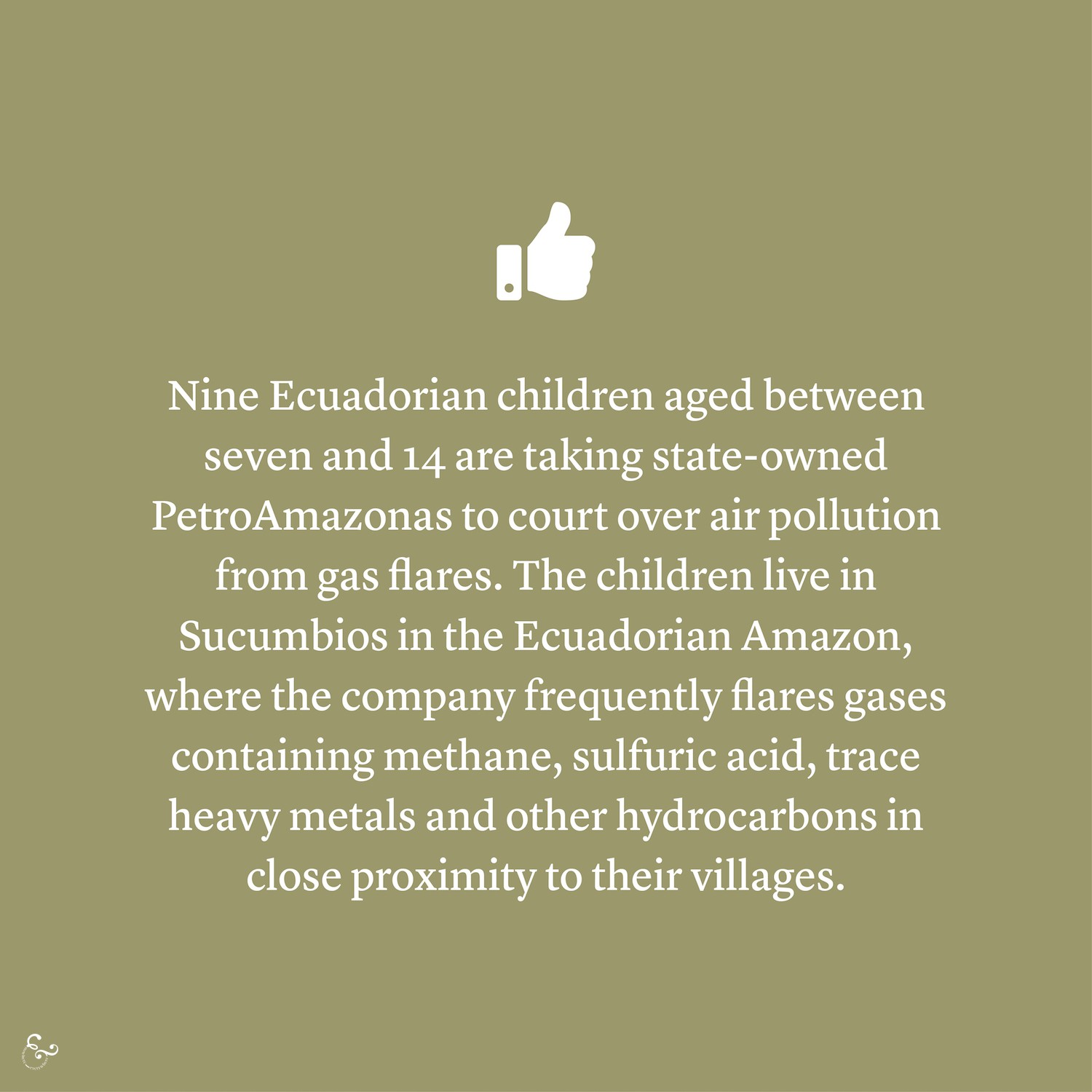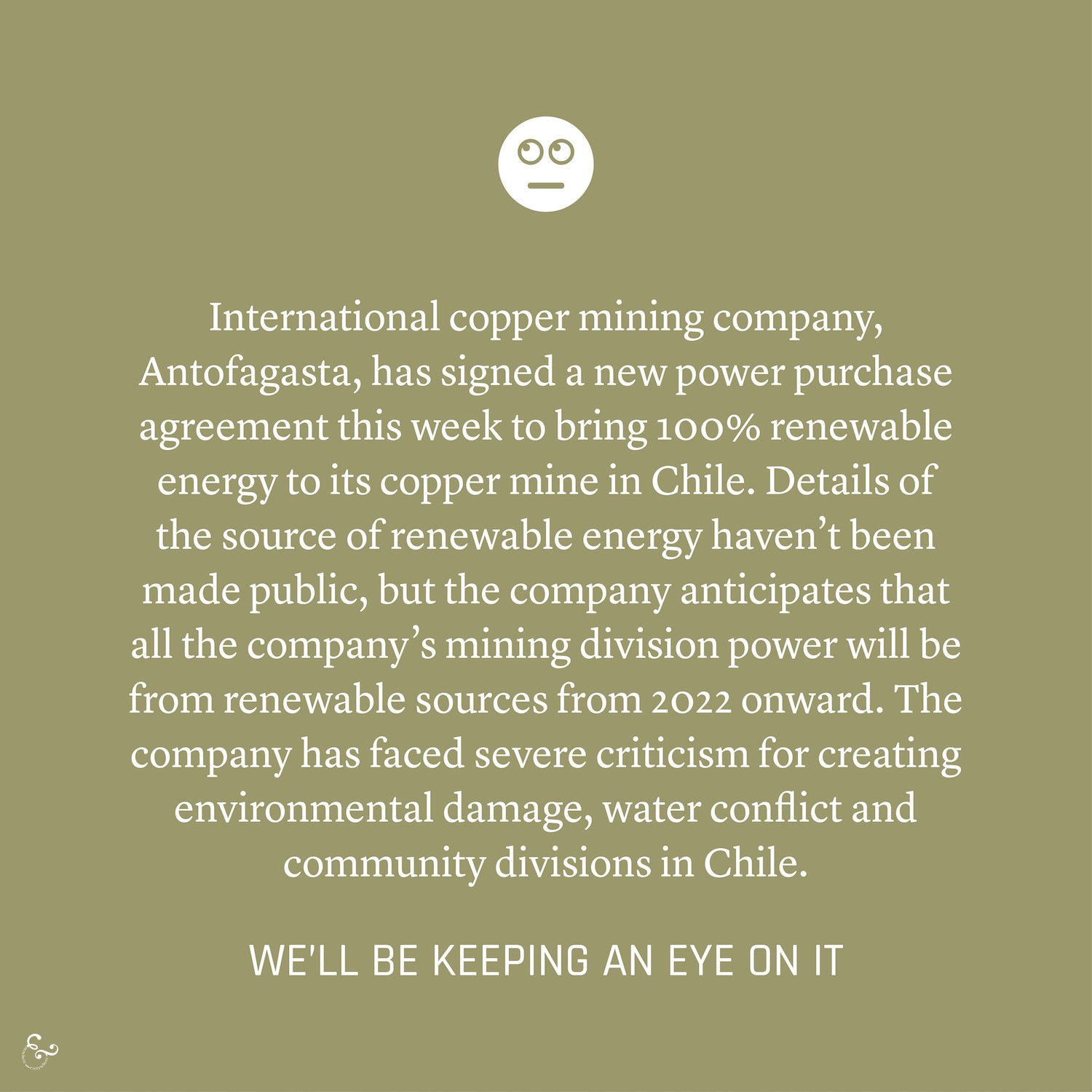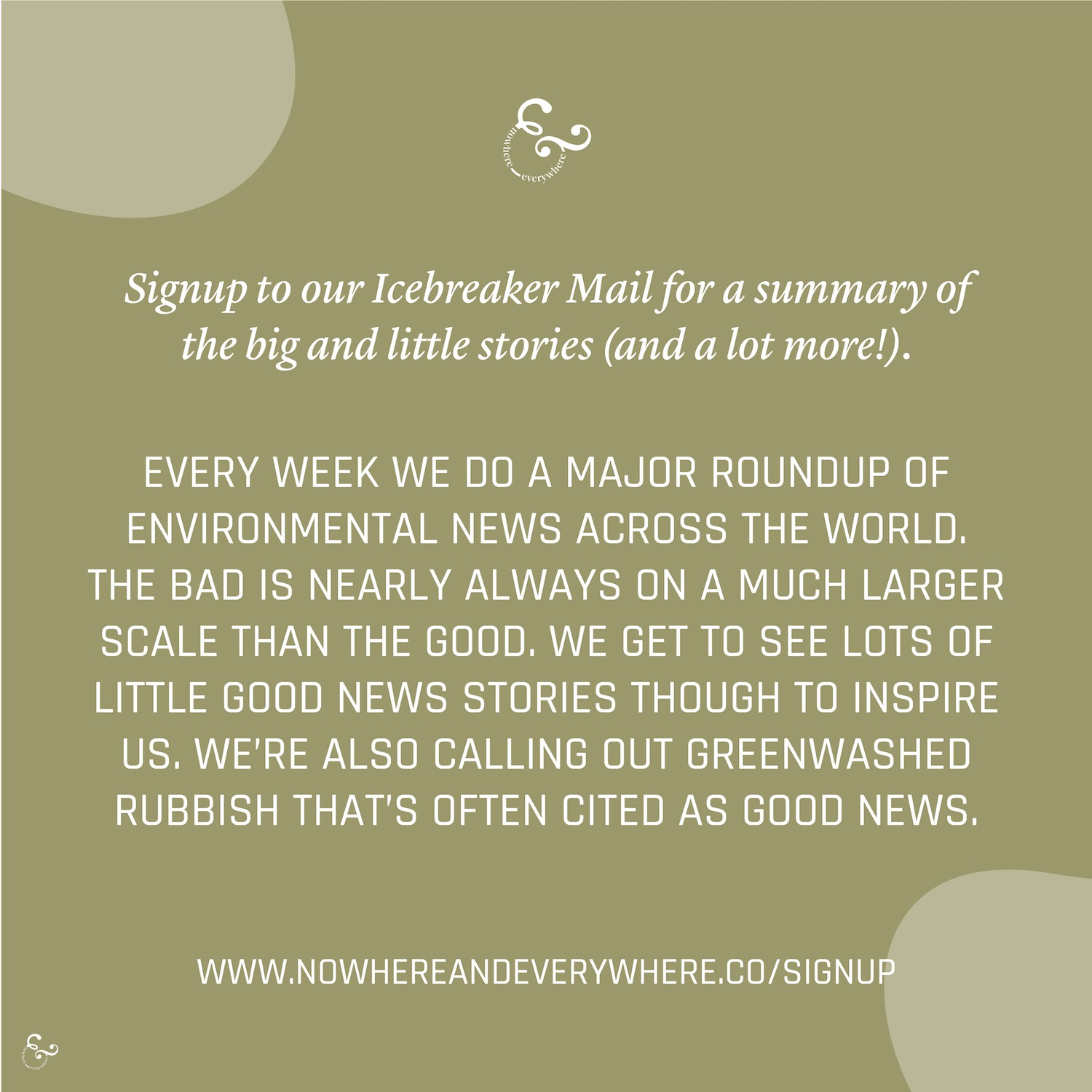Every week we do a major roundup of environmental news across the world. It is really important we all know it and share it, but it can also be pretty disheartening. The bad news is nearly always on a much, much larger scale than the good. The next few years are probably going to look the same as we enter climate feedback loops, profit incentives continue to grow, population increases and we continue to stall on our Paris Agreements. We’re interested in education, understanding systems, and the levers we can all pull for change.
But during this mammoth effort every week, we also get to see lots of little good news stories pass through our initial filter which we’re posting here. We can use these to inspire us, give us ideas in our own communities and potentially scale them up. Environmental good news can often be fairly greenwashed so we’re not interested in that and won’t consider it good news. If you see a story and decide to implement it where you live, we’d absolutely love to hear about it! Please tag us in or email us and let’s create a world of lots of local change which collectively has big impact.
- Climate activist, oscar winner and aerobics hero, Jane Fonda, has resurrected her iconic 80s workout on the video platform, Tik Tok, to promote her ‘Fire Drill Fridays’ climate campaign. For the last year, Fonda has lead protests in Washington DC to pressure US politicians to adopt the Green New Deal and end fossil fuel use – for which she has been arrested a reported five times. Whilst everyone is in isolation due to coronavirus, Fonda has been using her fame and platform (and privilege) to raise awareness for the climate emergency and encourage participation in ‘digital protests’ during the coronavirus outbreak. (Independent)
- A vegetable-growing farm in Victoria (Australia) is trialling natural pest defence methods that harness food webs rather than pesticides to prevent crop damage. The farm is planting sweet-smelling flowers, as well as a diversity of crops, to attract beneficial insects, such as ladybugs, who prey upon aphids, thrips and caterpillars. Pesticides don’t discriminate, and wipe out both pests and beneficial insects, including natural predators and pollinators. This ‘ecosystem’ approach to farming has the potential to reduce the costs associated with crop damage and pesticide use, as well as conserve and encourage biodiversity in agricultural landscapes. (ABC)
- Two Giant Pandas in Hong Kong Zoo have managed to successfully mate after a decade of trying. Classified as a ‘vulnerable’ species, the bears have a notoriously low birth rate, and there are only an estimated 1800 pandas in the wild. The species’ conservation status was lifted from ‘endangered’ in 2016 after decades of conservation efforts and captive breeding programs successfully increased populations by 17%. We aren’t fans of most zoos but we are fans of panda sex for the species! (WWF / Independent)
- Scientists have successfully genetically engineered a bacterial enzyme, discovered in a compost heap of leaves, to break down PET plastic bottles within hours. Currently with existing technologies, plastic bottles can only be ‘down-cycled’ into lower value products, but the mutant enzyme can achieve complete recycling by reducing the plastic to pure chemical building blocks. The company behind the breakthrough, Carbios, said it was aiming for industrial-scale recycling within five years. Given there is an estimated 6.3 billion tonnes of plastic waste scattered throughout the world, hopefully this new breakthrough will be deployed for reclaiming waste, rather than giving plastic industries and oil companies a license to continue production. (The Guardian)
- The Himalayas can be seen from parts of northern India for the first time in potentially decades after pollution dropped due to the coronavirus lockdown. Astoundingly, for residents who normally experience air quality that is five times worse than considered safe limits, this was the first time they had ever seen the mountains from their homes. (Independent / Snopes)
A seed bank in the UK has helped to save a ‘vulnerable’ clover wildflower in Australia, after the species’ range was wiped out during the 2019-2020 bushfires. Researchers at the Millenium Seed Bank in the UK sent over 250 clover seeds to Australia in the hope of re-growing them in the wild. Seed banks all over the world are being established to protect and conserve genetic diversity of plant and crop species, as diversity is the key to resilience in the face of climate-induced shocks such as bushfires, droughts and range shifts. (BBC)
A French renewable energy developer is planning a massive 600MW battery in Victoria (Australia), with four times the capacity of the first large-scale battery in the country that saved electricity consumers $150 million in its first two years of operation. At least 20 different battery and pumped-hydro storage projects are being proposed in the sunlight-rich country to protect electricity grids from the volatile nature of renewable electricity generation and improve reliability. Meanwhile, the government won’t rule out spending $300 million in taxpayer funds to extend the lifetime of an forty-five year old coal fired power station by four years. (Renew Economy / Newcastle Herald)
Thousands of British homes will be paid to use electricity during the day for the first time, as wind and solar projects produce a surge in clean energy during the coronavirus lockdown. On Sunday morning, wind farms contributed almost 40% of the UK’s electricity, while solar power made up almost a fifth of the power system. Fossil fuels made up less than 15% of electricity, of which only 1.1% came from coal plants. (The Guardian)
A 60,000 year old Cypress forest has been discovered submerged in the Gulf of Mexico, housing bacterial populations and animals that could hold the potential to develop new medicines and biotechnology. Marine animals and their symbiotic microorganisms that live on and in wood have recently been shown to be a potentially rich source for biomolecules of high biopharmaceutical value – such as antibiotics. If the sampled organisms have the potential to break down wood, they could have applications for producing cellulose-based textiles and plastics. (IFLS / NOAA)
- By analyzing enormous volumes of data using an optimization algorithm, researchers have identified key marine biodiversity hotspots to inform the creation of the first protected areas in the high seas. Under the current fragmented framework, countries individually manage marine parks in their own waters, and regulation of international waters (a global commons) has been difficult. The UN recently proposed a global high seas treaty to protect areas beyond national jurisdiction from being overexploited and degraded. A collaborative research team from 13 universities gathered to identify key areas for protection, so that treaty negotiations can be driven by comprehensive data that has already done the leg-work to balance competing interests. (Futurity)
- Aecom, a global infrastructure firm, announced that its emissions reduction targets have been approved by the globally-recognized Science Based Targets initiative (SBTi). Designed to meet the goals of the Paris Agreement, these targets include a 20% reduction in scope 1 and 2 emissions (produced by the company) and a 10% reduction in supply chain emissions by 2025 from the firm’s 2018 baseline. Can they do better? Of course. Is it better they have a certified plan to reduce emissions according to the latest climate science? Yes. (Environmental Leader)
- The UK arm of Greenpeace has won a legal challenge against an oil drilling permit granted to BP by the UK government. The permit was found to be unlawfully granted, as the government failed to publish its details, denying the public the opportunity to scrutinize the plans. Greenpeace will now apply to have BP’s permit revoked on the grounds that the company did not adequately assess its impact on the climate. At present, in many countries, fossil fuel companies are not required to assess the climate impacts of burning products (called Scope 3 emissions) in their Environmental Impact Assessment. However, a number of legal cases in the last few years have set the precedent for rejecting projects on climate change grounds. (The Ecologist)
- A UK plant charity is predicting a boost for wild flowers because some councils have stopped mowing verges and parks during the Covid-19 crisis. Roadside verges are one of the last refuges for the many plant species that have been devastated by the conversion of natural meadows into farmland and housing estates. These narrow strips of grassland are home to 700 species of wildflowers, nearly 45% of the UK’s total flora. This is of course not worth any lives lost due to a pandemic we were not prepared for, but it gives hope for future policy ideas and community solutions. (BBC)
- The Natural History Museum is set to transform its five-acre London gardens into a biodiversity hub and exemplar of urban wildlife research, conservation and awareness. The initiative is designed to re-engage people with the natural world and urban biodiversity through a UK-wide learning programme for young people, families and schools. By 2030, nine out of ten Brits will live in urban areas, and the importance of conserving wildlife, even in urban areas, is more important than ever. (NHM)
- At a time when the Trump administration is rolling back U.S. clean water regulations, New Jersey has stepped up protections on 600 miles of rivers and streams throughout the state. Key waterways will be designated under ‘Category One’ protections, which is second only to the protections given to streams and rivers in state and national parks. The designation strictly limits pollution and sewage discharges and creates 300-foot protected landscapes and wildlife habitat along both banks of designated streams. The protections will further boost New Jersey’s $11 billion-a-year recreation economy and will likely save taxpayers billions of dollars in water treatment and flood reduction costs. (Yale)
New research by environmental think-tank Carbon Tracker suggests that nearly half of all global coal plants will run at a loss this year. Of 6,696 existing plants and 1,046 in the pipeline, 46% will be unprofitable this year, up from 41% in 2019. In the UK, coal plants are closing earlier than the mandated 2025 deadline as the government’s carbon tax renders them economically unviable. Meanwhile, China is proposing to build more plants to stimulate its economy in the wake of the coronavirus pandemic, despite 60% of their fleet running at a loss. There are fears similar fossil fuel heavy stimulus packages will occur around the world after the pandemic, but Carbon Tracker warns that coal investments will become stranded assets. (Independent / Vox / Reuters / The Guardian)
After years of agricultural degradation in semi-arid Africa, farmers are regenerating felled trees, stumps and roots to protect their crops and improve grain yields. Farmers observed that trees and bushes could protect crops from harsh winds and seed loss as well as provide valuable nutrients and water retention for degraded soils. A practice known as ‘farmer managed natural regeneration’ is being deployed as a cheaper way to regenerate vegetation than expensive and often unsuccessful new planting initiatives. In Niger, trees have increased in about 12.3 million acres of degraded landscapes, enabling farmers to grow an additional 555,000 tonnes of grain to feed roughly 2.5 million people. Furthermore, the practice is improving gender inequities in the region, as women have more time to pursue opportunities to create income now that they do not have to walk as far to collect firewood. (Green Biz)
Nine Ecuadorian children aged between seven and 14 are taking state-owned PetroAmazonas to court over air pollution from gas flares. The children live in Sucumbios in the Ecuadorian Amazon, where the company frequently flares gases containing methane, sulfuric acid, trace heavy metals and other hydrocarbons in close proximity to their villages. Methane is highly flammable, and unregulated flaring risks explosions as well as other alleged health impacts including respiratory problems, severe headaches, skin irritation and the creation of potential cancer hotspots in nearby communities. (The Ecologist)
Keeping an eye out
Mining / International copper mining company, Antofagasta, has signed a new power purchase agreement this week to bring 100% renewable energy to its Centinela copper mine in Chile. Details of the source of renewable energy haven’t yet been made public, but the company’s CEO anticipates that all the company’s mining division power will be from renewable sources from 2022 onward. Globally, industry produces roughly 21% of emissions, and whilst this move to decarbonize their operations is welcome, mineral companies often have a questionable record for creating extensive environmental damage, resource conflicts and community divisions. The company has faced severe criticism for creating environmental damage, water conflict and community divisions in Chile. (Environmental Leader)
